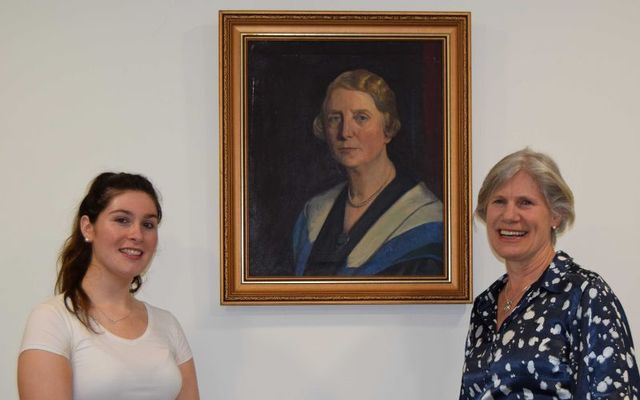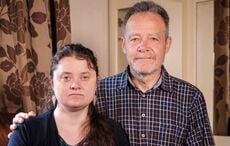"Uahn Uladh," a new film airing on TG4 on Friday, March 15, tells the story of a remarkable Irish woman who shaped the lives of generations of Irish women.
In the documentary, Clíodhna Ní Chorráin, a young Irish language activist from Co Armagh, explores the life and legacy of one of Ulster’s forgotten heroines, Úna Ní Fhaircheallaigh.
A remarkable visionary who strove to realize a utopian vision for Ireland, Ní Fhaircheallaigh's legacy has impacted the lives of generations of Irish women. Her activism shaped the development of education, politics, and sport across the island of Ireland.
The program takes its title from the pen name used by Ní Fhaircheallaigh, Uan Uladh (the Lamb of Ulster), but this Cavan woman was no lamb in her campaigning for women’s rights, education and for the restoration of the Irish language.
Born Agnes Winifred Farrelly in 1874 near Virginian in east Cavan, Úna Ní Fhaircheallaigh was the first woman to write a novel in the Irish language, one of the first female scholars of Celtic studies and the first female Professor of Irish in UCD. She was also a leading member of the Gaelic League, an ardent campaigner for women’s rights in education, and presided over the inaugural meeting of Cumann na mBan.
Úna counted Douglas Hyde, Roger Casement, Eoin Mac Néill and Pádraig Pearse among her closest friends, yet while they became household names, very little has been heard about this pioneering woman, until now.
In this documentary by Macha Media, with support from Northern Ireland Screen's Irish Language Broadcast Fund, Clíodhna Ní Chorráin follows in Úna’s footsteps, meeting relatives, academics and historians, to find out why history has neglected her and what we in the modern age can learn from her story.
Clíodhna visits Raffoney House, Úna’s homeplace, nestled in the undulating drumlins of County Cavan, where her father’s imposing gravestone stands testimony to the family’s wealth.
Clíodhna also visits Trinity College Dublin, where Úna’s grandniece, Cliona O’Farrelly, Chair of Comparative Immunology, continues the family tradition as a university professor.
Other highlights include a visit to the stunning cashel Dún Conor, on Inis Meáin off the coast of Galway, where Úna spent many summers perfecting her command of the language and set up a branch of the Gaelic League for the island’s female population. The journey leads her to the village of Gort a’ Choirce in the Donegal Gaeltacht, where the locals proudly recall Úna’s days as Principal of the Irish language college, Coláiste Uladh.
The film also looks at the political turmoil that engulfed Irish society in the early 20th century and its impact on Ní Fhaircheallaigh.
Popular cultural nationalism developed into political and physical force nationalism in the years before 1916. The Irish language movement itself became more militant. As younger members of the Gaelic League demanded total independence from Britain, instead of the promised Home Rule, Úna and others of her generation became increasingly uncomfortable, and she eventually left the Gaelic League in 1916.
Despite her personal setbacks, she continued to pursue her advocacy for the Irish language and for women’s rights, particularly in education, industry and sport. She was honorary life president of the Camogie Association, an active member of the Celtic Congress and was Professor of Irish in UCD until her retirement in 1947.
In 1937, Ní Fhaircheallaigh was actively involved in the National University Women Graduates' Association campaign against the new Irish constitution, Bunreacht na hÉireann. The NUWGA were seeking deletion of articles which they believed discriminated against women. Their efforts were to meet with disappointment when An Taoiseach, Éamon de Valera, chose not to amend the offending articles.
Úna died in 1951 and her funeral was attended by the President of Ireland, Seán T. Ó Ceallaigh, An Taoiseach, Éamon de Valera, as well as by many other dignitaries of the era.
The program ends at Úna’s grave in Deansbridge cemetery in Dublin. Clíodhna reflects on Uan Uladh’s achievements and takes inspiration from a remarkable educationalist and Irish language activist who opened doors for girls and women in the fields of education, industry and sport.
“Úna Ní Fharcheallaigh had a radical vision. She believed that Irish independence should lead to proper equality for women and the restoration of the Irish language, and that society would be fairer for everyone," says Ní Chorráin.
"Perhaps she was a little naïve, especially when dealing with clerics and professional politicians who had lost their idealism, if they ever had it in the first place. But she never stopped struggling throughout her life for people who had no power, especially women.”
"Uan Uladh: Scéal Úna Ní Fhaircheallaigh" will air on TG4 on Friday, March 15 at 8 pm.




Comments